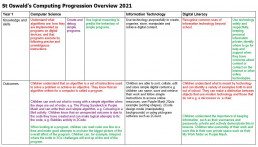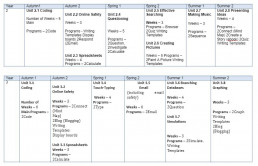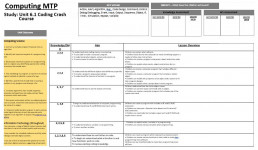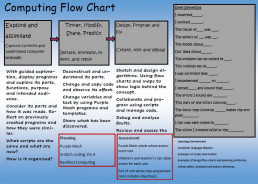Computing
Our Intent
National Curriculum Guidance
“Pupils are taught the principles of information and computation, how digital systems work, and how to put this knowledge to use through programming. Building on this knowledge and understanding, pupils are equipped to use information technology to create programs, systems, and a range of content. Computing also ensures that pupils become digitally literate – able to use, and express themselves and develop their ideas through, information and communication technology.”
Our intent is that the teaching of computing will:
- Give our pupils the life-skills that will enable them to embrace and utilise new technology in a socially responsible and safe way in order to flourish so that pupils are respectful and competent users of data, information and communication.
- Instil critical thinking, reflective learning and a ‘can do’ attitude for all our pupils, when engaging with technology and its associated resources.
- Teach pupils the principles of information and computation, how digital systems work and how to put this knowledge to use through programming in different contexts.
- Enthuse and equip children with the capability to use technology to assist their reflective learning on other subjects across the curriculum.
Our Implementation
The key areas of implementation we use are:
- Planning documents
- Progression map
- Long Term Plan
- Medium Term plans
Flow Chart
The flow chart serves as an overview of how the subject is taught to ensure consistency in the following areas:
- Lesson structure
- Assessment
- Learning environment
- Resources
- Metacognitive scaffolding including knowledge organisers
- How we enhance the curriculum e.g. visits, celebrations, theme weeks
Impact
At St Oswald’s we see our children flourish through the wide-ranging curriculum to provide them with. We strive for the whole curriculum to be exciting, engaging and for all children to feel a sense of success. In Computing, we aim for the impact to be:
- Children really enjoy computing and look forward to their lessons each week.
- Digital leaders promote the importance of online safety to their peers.
- Children are confident in their abilities to use computer to approach a wide range of tasks safely, and can use these skills in other areas of their lives.
- Children will have a comprehensive knowledge of how to stay safe online. This is important in a society which is becoming increasingly dependent on technology and where technologies are rapidly evolving.




